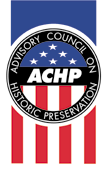 About ACHP
About ACHP ACHP News
National Historic
Preservation
Program
Working with
Section 106
Federal, State, & Tribal Programs
Training & Education
Publications
Search
Home
Federal Highway Administration and
Historic Preservation
 The Federal Highway Administration (FHWA) is a federal agency within the U.S. Department of Transportation. Funded through the Safe Accountable, Flexible, Efficient Transportation Equity Act: A Legacy for Users (SAFETEA-LU), FHWA provides state transportation agencies and local governments with grants for a wide variety of programs including construction and maintenance of surface transportation projects, development of regional and statewide transportation plans, research, and transportation enhancements.
The Federal Highway Administration (FHWA) is a federal agency within the U.S. Department of Transportation. Funded through the Safe Accountable, Flexible, Efficient Transportation Equity Act: A Legacy for Users (SAFETEA-LU), FHWA provides state transportation agencies and local governments with grants for a wide variety of programs including construction and maintenance of surface transportation projects, development of regional and statewide transportation plans, research, and transportation enhancements.
As a Federal agency that provides assistance to states for construction, improvements, and maintenance to our nation’s highways, FHWA must work closely with state and local applicants to ensure that historic properties are given full consideration in highway and bridge project planning and construction. FHWA’s regulations and guidance promote environmental stewardship and the integration of its historic preservation responsibilities under Section 106 of the National Historic Preservation Act (NHPA) with environmental review requirements contained in the National Environmental Policy Act (NEPA) and Section 4(f) of the Department of Transportation Act.
The FHWA Historic Preservation and Archaeology Program provides guidance and technical assistance to Federal, State, and local government staff regarding these Federal laws, as well as regulations, executive orders, policy, procedures, and training on topics related to historic preservation and cultural resources. FHWA’s Historic Preservation website provides information about the Federal-aid highway program and guidance for compliance with Section 106 and other environmental laws, recommendations, and successful practices to help address historic preservation/cultural resource issues during the transportation project planning and development process. (read more here).
FHWA –ACHP Partnership
Since February of 2004, the FHWA has partnered with the ACHP to support a full time senior staff position at the ACHP to serve as the principle point of contact for handling FHWA program and project review. The position is within the Office of Federal Agency Programs (OFAP) at the ACHP. In addition to assisting FHWA divisions in completing Section 106 review, the ACHP’s Liaison works with FHWA and the Department of Transportation on the development legislation, regulations, and implementing guidance for programs with the potential to affect historic properties. The partnership between FHWA and the ACHP has had many benefits, and has resulted in:

- Tracking patterns and trends in Section 106 compliance on FHWA undertakings and the identification of best practices;
- A national exemption for the Interstate Highway System;
- Research and guidance on integrating Section 106 and transportation planning;
- Innovative approaches for compliance with Section 106, such as ACHP guidance on statewide Programmatic Agreements to streamline Section 106 review;
- Outreach to State and Tribal Historic Preservation Officers about SAFETEA-LU and new FHWA regulations and guidance;
- Active ACHP participation in workshops, panels, training, and workgroups, hosted by FHWA and with other transportation organizations, including the Transportation Research Board (TRB) and American Association of State and Highway Transportation Officials (AASHTO); and
- Advanced training in Section 106 and a workshop on Native American consultation for Department of Transportation employees.
ACHP Staff Point of Contact
Carol Legard, FHWA Liaison
Phone: 202-606-8522
Email: clegard@achp.gov
For More Information
- FHWA Historic Preservation and Archaeology Program
- FHWA Legislation, Regulations, and Implementing Guidance
- Section 4(f) of the Department of Transportation Act
- Statewide Programmatic Agreements
- FHWA Program Contacts
- Interstate Highway Exemption
- Advanced Section 106 Seminar
- Integrated Planning
Updated
November 27, 2008